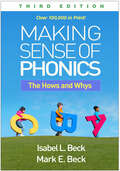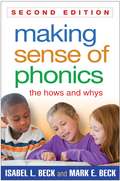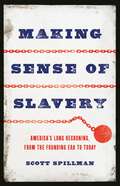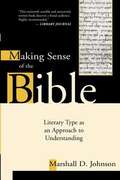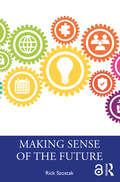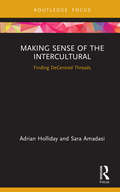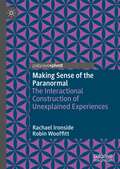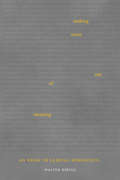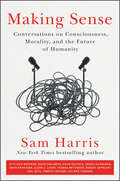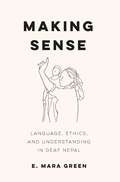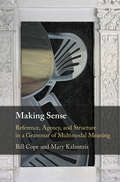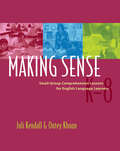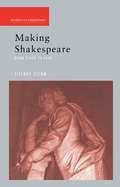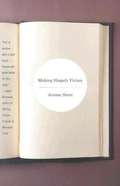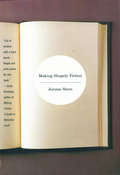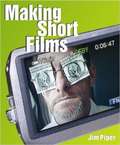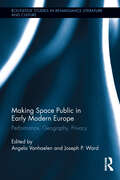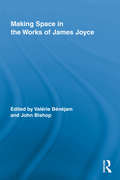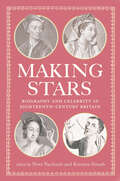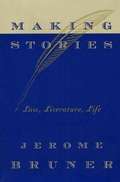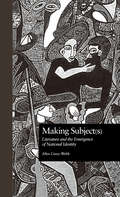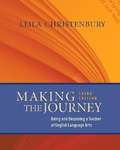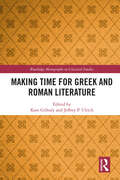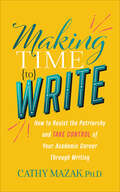- Table View
- List View
Making Sense of Phonics: The Hows and Whys
by Isabel L. Beck Mark E. BeckNow in a revised and updated third edition incorporating a decade of additional research and classroom experience, this book has helped over 100,000 primary-grades teachers understand and successfully apply the science of reading in phonics instruction. Isabel L. Beck and Mark E. Beck present innovative approaches to assessing and teaching letter–sound relationships, blending, Word Building, multisyllabic decoding, fluency, and more. A wealth of reproducible forms and word lists can be copied from the book or downloaded and printed; the companion website also features supplemental word lists, word and syllable cards, and 30 illustrated Syllasearch stories. Engaging teacher anecdotes and end-of-chapter "Your Turn" activities enhance the book's utility as a professional development resource and course text. New to This Edition *Chapter on the key role of phonics in today's literacy programs--with a focus on what is needed for high-quality instruction aligned with the science of reading. *Chapter on extending Word Building instruction to small groups and individual students. *Extensive revision of the Syllasearch activity for decoding multisyllabic words. *Expanded reproducible and downloadable tools, including enhanced Word Building lists, new Syllasearch lists (with teaching tips), and eight new Syllasearch stories.
Making Sense of Phonics: The Hows and Whys
by Isabel L. Beck; Mark E. BeckThis bestselling book provides indispensable tools and strategies for explicit, systematic phonics instruction in K-3. Teachers learn effective ways to build students' decoding skills by teaching letter-sound relationships, blending, word building, multisyllabic decoding, fluency, and more.
Making Sense of Slavery: America's Long Reckoning, from the Founding Era to Today
by Scott SpillmanAn &“essential&” (James Oakes, author of The Crooked Path to Abolition) history of the study of slavery in America, from the Revolutionary era to the 1619 Project, showing how these intellectual debates have shaped American public life In recent years, from school board meetings to the halls of Congress, Americans have engaged in fierce debates about how slavery and its legacies ought to be taught, researched, and narrated. But since the earliest days of the Republic, political leaders, abolitionists, judges, scholars, and ordinary citizens have all struggled to explain and understand the peculiar institution. In Making Sense of Slavery, historian Scott Spillman shows that the study of slavery was a vital catalyst for the broader development of American intellectual life and politics. In contexts ranging from the plantation fields to the university classroom, Americans interpreted slavery and its afterlives through many lenses, shaping the trajectory of disciplines from economics to sociology, from psychology to history. Spillman delves deeply into the archives, and into the pathbreaking work of scholars such as W. E. B. Du Bois and Annette Gordon-Reed, to trace how generations of Americans have wrestled with the paradox of slavery in a country founded on principles of liberty and equality. As the debate over the place of slavery in our history rages on, Making Sense of Slavery shows that what is truly central to American history is this very debate itself.
Making Sense of the Bible: Literary Type as an Approach to Understanding
by Marshall D. JohnsonFocusing on the eight major literary forms in the Bible -- wisdom literature, liturgical materials, quasi-historical material, prophetic writings, collections of laws and precepts, apocalyptic literature, letters, and Gospels -- Johnson describes each form's central features and gives readers a sense of what to expect from each literary form and how to approach it.
Making Sense of the Future
by Rick SzostakMaking Sense of the Future integrates the latest thinking in Future Studies with the author’s expertise in world history, economics, interdisciplinary studies, knowledge organization, and political activism. The book takes a systems approach that recognizes the complexity of our world. It begins by suggesting a set of goals for human societies and identifying innovative strategies for achieving these goals that could gain broad support. Each chapter begins with a “How to” section that discusses how we can identify goals, strategies, trends, surprises, or implementation strategies and concludes with an integrative analysis that draws connections across the preceding discussions. Taking a cross-disciplinary approach, Szostak explores key trends and how these interact so that he can develop strategies to guide trends towards desirable futures. He discusses the ways in which we can best prepare for surprises such as epidemics and natural disasters, enabling us to react to them in beneficial ways. Supported by a list of guiding questions and suggestions for class projects, this is an accessible textbook for students of Future Studies and Future Studies courses.
Making Sense of the Intercultural: Finding DeCentred Threads (Routledge Focus on Linguistics)
by Adrian Holliday Sara AmadasiIn this book we wish to find a new way of talking about, connecting and operationalising the third space, narratives, positioning, and interculturality. Our purpose is to shake established views in what we consider to be an urgent quest for dealing with prejudice. We therefore seek to draw attention to the following: How Centre structures and large culture boundaries are sources of prejudice How deCentred intercultural threads address prejudice by dissolving these boundaries How, in everyday small culture formation on the go, the cultural and the intercultural are observable and become indistinguishable How agency, personal and grand narratives, discourses, and positioning become visible in unexpected ways How we researchers also bring competing narratives in making sense of the intercultural How third spaces are discordant and uncomfortable places in which all of us must struggle to achieve interculturality This book is therefore a journey of discovery with each chapter building on the previous ones. While throughout there are particular empirical events (interviews, reconstructed ethnographic accounts and research diary entries) with their own detailed analyses and insights, they connect back to discussion in previous chapters.
Making Sense of the Paranormal: The Interactional Construction of Unexplained Experiences
by Robin Wooffitt Rachael IronsideThis book is a study of how people collaboratively interpret events or experiences as having paranormal features, or as evidence of spiritual agency. The authors study recordings of paranormal research groups as they conduct real life investigations into allegedly haunted spaces and the analyses describe how, through their talk and embodied actions, participants collaboratively negotiate the paranormal status of the events they experience.By drawing on the study of the social organisation in everyday interaction, they show how paranormal interpretations may be proposed, contested and negotiated through conversational and embodied practices of the group. The book contributes to the sociology of anomalous experience, and explores its relevance to other social science topics such as dark tourism, participation in religious spaces and practices, and the attribution of agency. This book will therefore be of interest to academics and postgraduate researchers of language and social interaction; discourse and communication, cultural studies; social psychology, sociology of religious experience; parapsychology, communication and psychotherapy.
Making Sense out of Meaning: An Essay in Lexical Semantics
by Walter HirtleIn his exploration of word meaning, Walter Hirtle examines an important and controversial topic in lexical semantics: polysemy, the capacity of words to manifest a range of different meanings when employed in different contexts. Building on the work of French linguist Gustave Guillaume, Making Sense out of Meaning is a speaker-oriented study that describes how speakers form word meaning and not, as in other theories, how listeners interpret the meaning of what they hear. Hirtle develops a general model of the ways in which words and word meaning may be realized in discourse contexts and addresses such issues as the demarcation of polysemy and monosemy, metaphorical meaning, parts of speech, and the concept of conversion or zero derivation. Bringing together both lexical and grammatical components, Hirtle shows that distinct lexical senses can be observed and their relations can be understood by focusing on speakers' use of verbs and nouns. A methodical and thoughtful work, Making Sense out of Meaning situates its central question by recalling traditional views of language’s relation to thought and argues for meaning as a valid object of scientific inquiry.
Making Sense: A Guide to Sound Reasoning and Critical Thinking (Eighth Edition)
by Debra StevensThis is not a book on how to win arguments. We do not need to know how to make points and appear to be right. We need to learn how to think and speak honestly, with integrity. Developing integrity in one's thinking begins with carefully observing and questioning what one believes one sees and hears.
Making Sense: Conversations on Consciousness, Morality, and the Future of Humanity
by Sam HarrisFrom the bestselling author of Waking Up and The End of Faith, an adaptation of his wildly popular, often controversial podcast“Civilization rests on a series of successful conversations.” —Sam Harris Sam Harris—neuroscientist, philosopher, and bestselling author—has been exploring some of the most important questions about the human mind, society, and current events on his podcast, Making Sense. With over one million downloads per episode, these discussions have clearly hit a nerve, frequently walking a tightrope where either host or guest—and sometimes both—lose their footing, but always in search of a greater understanding of the world in which we live. For Harris, honest conversation, no matter how difficult or controversial, represents the only path to moral and intellectual progress. This book includes a dozen of the best conversations from Making Sense, including talks with Daniel Kahneman, Timothy Snyder, Nick Bostrom, and Glen Loury, on topics that range from the nature of consciousness and free will, to politics and extremism, to living ethically. Together they shine a light on what it means to “make sense” in the modern world.
Making Sense: Language, Ethics, and Understanding in Deaf Nepal
by E. Mara GreenA free ebook version of this title is available through Luminos, University of California Press's Open Access publishing program. Visit www.luminosoa.org to learn more.Making Sense explores the experiential, ethical, and intellectual stakes of living in, and thinking with, worlds wherein language cannot be taken for granted. In Nepal, many deaf signers use Nepali Sign Language (NSL), a young, conventional signed language. The majority of deaf Nepalis, however, use what NSL signers call natural sign. Natural sign involves conventional and improvisatory signs, many of which recruit semiotic relations immanent in the social and material world. These features make conversation in natural sign both possible and precarious. Sense-making in natural sign depends on signers' skillful use of resources and on addressees' willingness to engage. Natural sign reveals the labor of sense-making that in more conventional language is carried by shared grammar. Ultimately, this highly original book shows that emergent language is an ethical endeavor, challenging readers to consider what it means, and what it takes, to understand and to be understood.
Making Sense: Reference, Agency, and Structure in a Grammar of Multimodal Meaning
by Bill Cope Mary KalantzisThe phenomenon of multimodality is central to our everyday interaction. 'Hybrid' modes of communication that combine traditional uses of language with imagery, tagging, hashtags and voice-recognition tools have become the norm. Bringing together concepts of meaning and communication across a range of subject areas, including education, media studies, cultural studies, design and architecture, the authors uncover a multimodal grammar that moves away from rigid and language-centered understandings of meaning. They present the first framework for describing and analysing different forms of meaning across text, image, space, body, sound and speech. Succinct summaries of the main thinkers in the fields of language, communications and semiotics are provided alongside rich examples to illustrate the key arguments. A history of media including the genesis of digital media, Unicode, Emoji, XML and HTML, MP3 and more is covered. This book will stimulate new thinking about the nature of meaning, and life itself, and will serve practitioners and theorists alike.
Making Sense: Small-Group Comprehension Lessons for English Language Learners
by Juli Kendall Outey KhuonReading is all about understanding. How do we know our kids are getting it—and what do we do when they don't get it? Authors Juli Kendall and Outey Khuon believe that small group comprehension lessons have a key role to play in advancing students' understanding of texts. Making Sense: Small-Group Comprehension Lessons for English Language Learners , they provide answers to many common questions asked by teachers of ELL. It is an easy-to-use, practical resource for ELD, ESL, and ESOL teachers.The book's five main sections are geared to the stages of language proficiency, and lessons span kindergarten through grade 8. The authors outline 52 lessons that teach students how to make connections, visualize, infer, and determine importance. Each lesson follows a four-part teaching framework: Start Up/Connection: Helping students build background and use prior knowledge to connect to the lesson Give Information : Explicitly telling students what they are going to learn and why they are learning it Active Involvement : Students practice what they are learning while the teacher monitors and adjusts instruction accordingly Off-You-Go!: Opportunities for students to practice what they learned with peers or independently. Making Sense will appeal to experienced teachers seeking to expand their repertoire of lessons, as well as new teachers just beginning the adventure of teaching comprehension to English language learners.
Making Shakespeare: From Stage to Page (Accents on Shakespeare)
by Tiffany SternMaking Shakespeare is a lively introduction to the major issues of the stage and print history, whilst also raising questions about what a Shakespeare play actually is. Tiffany Stern reveals how London, the theatre, the actors and the way in which the plays were written and printed all affect the 'Shakespeare' that we now read. Concentrating on the instability and fluidity of Shakespeare's texts, her book discusses what happened to a manuscript between its first composition, its performance on stage and its printing, and identifies traces of the production system in the plays we read. She argues that the versions of Shakespeare that have come down to us have inevitably been formed by the contexts from which they emerged; being shaped by, for example, the way actors received and responded to their lines, the props and music used in the theatre, or the continual revision of plays by the playhouses and printers. Allowing a fuller understanding of the texts we read and perform, Making Shakespeare is the perfect introduction to issues of stage and page. A refreshingly clear, accessible read, this book will allow even those with no expert knowledge to begin to contextualize Shakespeare's plays for themselves, in ways both old and new.
Making Shapely Fiction
by Jerome SternJerome Stern maintains that learning to write spontaneously is the first step to writing well. You will see how a work takes form and shape once you grasp the principles of momentum, tension, and immediacy. "Tension," Stern says, "is the mother of fiction. When tension and immediacy combine, the story begins." Dialogue and action, beginnings and endings, the true meaning of "write what you know," and a memorable listing of don'ts for fiction writers are all covered. A special section features an Alphabet for Writers: entries range from Accuracy to Zigzag, with enlightening comments about such matters as Cliffhangers, Point of View, Irony, and Transitions.
Making Shapely Fiction
by Jerome SternA deft analysis and appreciation of fiction--what makes it work and what can make it fail. Here is a book about the craft of writing fiction that is thoroughly useful from the first to the last page--whether the reader is a beginner, a seasoned writer, or a teacher of writing. You will see how a work takes form and shape once you grasp the principles of momentum, tension, and immediacy. "Tension," Stern says, "is the mother of fiction. When tension and immediacy combine, the story begins." Dialogue and action, beginnings and endings, the true meaning of "write what you know," and a memorable listing of don'ts for fiction writers are all covered. A special section features an Alphabet for Writers: entries range from Accuracy to Zigzag, with enlightening comments about such matters as Cliffhangers, Point of View, Irony, and Transitions.
Making Short Films
by Jim PiperAccompanying DVD of thirty short films offers an instructive mini film festival Shows beginners how to make meaningful films without fancy equipment Great for film students and independent filmmakers Want to make an art film, a documentary, a video biography? Here’s how to create real movies using consumer digital video format-without spending a lot of money or time. Author Jim Piper has taught filmmaking for more than thirty years-and along with his technical expertise, he brings entertaining anecdotes and great examples. His descriptions of more than one hundred student films, illustrated with three hundred stills, offer inspiration for beginners, and the accompanying DVD showcases thirty examples that comprise an intriguing and instructive mini film festival.Allworth Press, an imprint of Skyhorse Publishing, publishes a broad range of books on the visual and performing arts, with emphasis on the business of art. Our titles cover subjects such as graphic design, theater, branding, fine art, photography, interior design, writing, acting, film, how to start careers, business and legal forms, business practices, and more. While we don't aspire to publish a New York Times bestseller or a national bestseller, we are deeply committed to quality books that help creative professionals succeed and thrive. We often publish in areas overlooked by other publishers and welcome the author whose expertise can help our audience of readers.
Making Space Public in Early Modern Europe: Performance, Geography, Privacy (Routledge Studies in Renaissance Literature and Culture #Vol. 23)
by Joseph P. Ward Angela VanhaelenBroadening the conversation begun in Making Publics in Early Modern Europe (2009), this book examines how the spatial dynamics of public making changed the shape of early modern society. The publics visited in this volume are voluntary groupings of diverse individuals that could coalesce through the performative uptake of shared cultural forms and practices. The contributors argue that such forms of association were social productions of space as well as collective identities. Chapters explore a range of cultural activities such as theatre performances; travel and migration; practices of persuasion; the embodied experiences of lived space; and the central importance of media and material things in the creation of publics and the production of spaces. They assess a multiplicity of publics that produced and occupied a multiplicity of social spaces where collective identity and voice could be created, discovered, asserted, and exercised. Cultural producers and consumers thus challenged dominant ideas about just who could enter the public arena, greatly expanding both the real and imaginary spaces of public life to include hitherto excluded groups of private people. The consequences of this historical reconfiguration of public space remain relevant, especially for contemporary efforts to meaningfully include the views of ordinary people in public life.
Making Space in the Works of James Joyce (Routledge Studies in Twentieth-Century Literature)
by John Bishop Valérie BénéjamJames Joyce’s preoccupation with space—be it urban, geographic, stellar, geometrical or optical—is a central and idiosyncratic feature of his work. In Making Space in the Works of James Joyce, some of the most esteemed scholars in Joyce studies have come together to evaluate the perception and mental construction of space, as it is evoked through Joyce’s writing. The aim is to bring together several recent trends of literary research and criticism to bear on the notion of space in its most concrete sense. The essays move dialectically out of an immediate focus on the phenomenological and intra-psychic, into broader and wider meditations on the social, urban and collective. As Joyce’s formal experiments appear the response to the difficulty of enunciating truly the experience of lived space, this eventually leads us to textual and linguistic space. The final contribution evokes the space with which Joyce worked daily, that of his manuscripts—or what he called "paperspace." With essays addressing all of Joyce's major works, this volume is a critical contribution to our understanding of modernism, as well as of the relationship between space, language, and literature.
Making Stars: Biography and Celebrity in Eighteenth-Century Britain (Performing Celebrity)
by Glynis Ridley Stuart Sherman Jack Lynch Rebecca Tierney-Hynes Sarah Ailwood Miriam L. Wallace Sören Hammerschmidt Jane Wessel Heather McPherson Elaine McGirr Semane Parsons Kevin Bourque Anne Betty Weinshenker Teri Doerksen Kirsten Teresa SaxtonIn bringing biography and celebrity together, the essays in Making Stars interrogate contemporary and current understandings of each. Although biography was not invented in the eighteenth century, the period saw the emergence of works that focus on individuals who are interesting as much, if not more, for their everyday, lived experience than for their status or actions. At the same time, celebrity emerged as public fascination for the private lives of publicly visible individuals. Biography and celebrity are mutually constitutive, but in complex and varied ways that this volume unpacks. Contributors to this volume present us a picture of eighteenth-century celebrity that was mediated across multiple sites, demonstrating that eighteenth-century celebrity culture in Britain was more pervasive, diverse and, in many ways, more egalitarian, than previously supposed.
Making Stories: Law, Literature, Life
by Jerome S. BrunerStories pervade our daily lives, from human interest news items, to a business strategy described to a colleague, to daydreams between chores. Stories are what we use to make sense of the world. But how does this work? In Making Stories, the eminent psychologist Jerome Bruner examines this pervasive human habit and suggests new and deeper ways to think about how we use stories to make sense of lives and the great moral and psychological problems that animate them. Looking at legal cases and autobiography as well as literature, Bruner warns us not to be seduced by overly tidy stories and shows how doubt and double meaning can lie beneath the most seemingly simple case.
Making Subject: Literature and the Emergence of National Identity (Comparative Literature and Cultural Studies #4)
by Allen Carey-WebbFirst published in 1998. Routledge is an imprint of Taylor & Francis, an informa company.
Making The Journey, Third Edition: Being And Becoming A Teacher Of English Language Arts
by Leila ChristenburyMaking the Journey is a staple of secondary English methods courses and teacher libraries because it not only provides practical advice on what to do in the classroom and how to act, but also offers a realistic but optimistic sense of what it means to embrace the practice of good teaching. Now, trusted educator, writer, and researcher Leila Christenbury has returned with a remarkable new edition of her classic. The third edition of Making the Journey will be both refreshingly new and satisfyingly familiar to those who've come to rely on Christenbury's wisdom and uncommon common sense. Every chapter has been revised and updated with new examples, the latest research, and stories from today's classrooms. Even more important, Christenbury has devoted new sections to discussing instructional and political topics crucial to the contemporary teacher, including: supporting English language learners developing students' ability to write on demand meeting the challenge of high - stakes standardized testing balancing depth of coverage with breadth in standards - based curricular planning creating tests and other assessments that align with curricular goals and provide useful information for subsequent instruction engaging students' reading interests through nontraditional, real - world genres like graphic novels teaching writing and media literacy through digital - age innovations such as blogs and WebQuests navigating the politics of school while remaining an activist professional With the latest, smartest strategies, techniques, and ideas as well as Leila Christenbury's trademark pragmatism and know - how, the third edition of Making the Journey will be an indispensable guide for anyone just starting their own journey into teaching or for anyone already on their way.
Making Time for Greek and Roman Literature (Routledge Monographs in Classical Studies)
by Kate Gilhuly Jeffrey P. UlrichThe essays in this collection explore various various models of representing temporality in ancient Greek and Roman literature to elucidate how structures of time communicate meaning, as well as the way that the cultural impact of measured time is reflected in ancient texts. This collection serves as a meditation on the different ways that cosmological and experiential time are construed, measured, and manipulated in Greek and Latin literature. It explores both the kinds of time deemed worthy of measurement, as well as time that escapes notice. Likewise, it interrogates how linear time and its representation become politicized and leveraged in the service of emerging and dominant power structures. These essays showcase various contemporary theoretical approaches to temporality in order to build bridges and expose chasms between ancient and modern ideologies of time. Some of the areas explored include the philosophical and social implications of time that is not measured, the insights and limitations provided by queer theory for an investigation of the way sex and gender relate to time, the relationship of time to power, the extent to which temporal discourses intersect with spatial constructs, and finally an exploration of experiences that exceed the boundaries of time. Making Time for Greek and Roman Literature is of interest to scholars of time and temporality in the ancient world, as well as those working on time and temporality in English literature, comparative literature, history, sociology, and gender and sexuality. It is also suitable for those working on Greek and Roman literature and culture more broadly.
Making Time to Write: How to Resist the Patriarchy and TAKE CONTROL of Your Academic Career Through Writing
by Cathy MazakThe revolutionary guide to putting women’s writing--and their careers—first.
